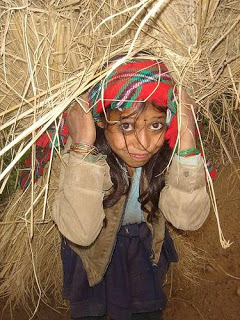CHILDREN OF A LESSER GOD
 |
| Child labour has become a serious problem before many countries in the world. Photo: scannepal.blogspot.com |
(This article was originally published in The Rising Nepal)
It is quite unfortunate that despite spending so much money and time, the child related cases such as exploitation, physical torture, child trafficking, sexual abuse and so on are on the rise. In recent time the cases of child exploitation has dramatically increased in urban areas. However, the situation of child labor and their exploitation in rural areas is also not good. This presents a bleak picture of the future of Nepali working children.
It seems that either the government has taken the
matter of child labor for granted; or the government has not put all its
efforts to battle against child labor. The matter of child labor should be
taken with utmost seriousness, because children are physically weak and
therefore they are susceptible to all kinds of exploitation.
Most
of the children, who live in rural areas, are more likely to drop out after a
few years of schooling. Many parents, who live below the poverty line in rural
areas, have to struggle to make both ends meet. In a situation like this, they
are unable to provide financial support to their children. So, some children
leave schools and help their parents in the field. Others leave homes and go to nearby cities to
live an independent life---some of them end up becoming just street children.
According to a report, 41 percent of the total
population of the country is constituted of children. It indicates that a big
portion of the population is comprised of children. The welfare of the children
is not only the responsibility of their parents, but the state should also play
a key role in creating an environment where children can grow and prosper.
Today child labor has become a global issue. In recent years, the movements of various countries have shown their keen
interest in curbing child labor, but with very little success. At a time when
many countries are vociferously talking about child rights, things are not rosy
here in Nepal. Child-related cases have unexpectedly surged in the last decade in the country. In fact, statistics indicate that the cases of child
labor and child abuse have not increased alarmingly. However, many scholars do
not agree with such data. According to the situation of child labor is more
serious in the country than it seems, because most of the child-related cases
go unreported.
Various studies have confirmed that a large number
of children are working under precarious conditions. Under such an environment,
these children are exposed to serious health hazards---this cannot go without our
notice. It is however believed that about twenty-six hundred thousand children
are currently being exploited in various forms in the country. Among them, about
one hundred fifty thousand children are engaged in hazardous works.
Much has been done to eradicate child labor from
the face of the world but without much success. The overall condition of child
labor in Asia is much more deplorable than in some other parts of the world. It
does not mean that concerted efforts have not been made to eliminate child
labor. There are several national and international organizations, which have
taken up the cudgels against child labor, but the ghost of child labor remains
as elusive as ever.
Despite the government’s claims to achieving some
major success in curving child labor, the overall situation of child labor in
Nepal has not improved much. Many critics even say the situation of child labor
has turned bad for worse in recent years. In the past, the decade-old Maoists'
armed struggle against the state had further dragged the situation to a very
miserable condition. The bloody war took a heavy toll on lives that only added
more orphans in the country. Due to the lackluster attitude of the state,
many of these children had become the victims of child trafficking, domestic
violence, child labor, sexual abuse and many of them turned to become street
children.
Now the onus is on the incumbent government to
tackle the problem of hundreds of children who do not go to schools. Due to
abject poverty, these children do different types of works to make a meager sum
of money. If the government still shows a lethargic attitude to tackle the present
state of child labor, the additional number of working children might make the situation even more complicated. Thus, timely action from the government is the
need of the hour.
There are many NGOs and INGOs that work independently
in the country. These organizations leave no opportunity to boast themselves of
achieving unprecedented success. However, in reality, they talk more but work
less. Over the years, many organizations
have come into existence with the purpose of child welfare activities. However,
looking at their activities it seems that their main purpose is not to serve
but to earn.
According
to a report presented by the Central Bureau of Statistics (CBS) Nepal, “According
to the Nepal Labour Force Survey 2008, there were about 7.77 million children
in Nepal between 5 and 17 years of age, of which 50.7 percent were boys and
49.3 percent girls. That number has grown steadily as families have been
broken apart by economic hardship, leaving children to fend for themselves.
Children are often seen begging, or working in the streets, cafes, petrol
stations, sometimes even late into the night. Children, especially girls, are also
sexually exploited for commercial purposes, especially in prostitution and
pornography. Trafficking of children is a regular phenomenon to which the
thousands of children living in street and orphanages are particularly prone”.
Nepal being an agricultural country most of the children
are involved in the agricultural field. They are also used in other sectors such as
construction sites, hotels, and restaurants, houses, transportation sector, shops,
etc. Moreover, over five thousand children live on the streets. They are popularly
known as khate. These khate children live hazardous life as they are constantly
exposed to drugs and violence. About four thousand such street children spend
most of their time collecting plastic bags and rubbish. The number of boys is
greater than girls.
Girl children are always an easy target for
girl traffickers. According to various news reports, every year about twelve
thousand girls are trafficked to India. Among them, most of the girls are aged below
sixteen years. In fact, several efforts have been made both at the private and government
levels to curb girls trafficking, but the success is relatively far below than
expected.
Social inequality, unemployment, lack of
education, superstition, and family feud are a few to name which have created
bottlenecks in the efforts of fighting against child labor.
So far, most of the efforts of the government have
merely fizzled out due to lack of proper co-operation between different
organizations. It is therefore advisable that private and government organizations
must work in unison so that the working condition of children can be improved
to a respectable standard.
Recently, the government has
formed National Child Labor Elimination Committee (NCEC) to study child labor
and to establish a National Master Plan to eliminate child labor. This
committee has determined to root out child labor by 2022 and all forms of child
labor by 2025. It is also known that the government has launched a Decent Work
Country Program and the Social Security Fund Program. The prime intention of
these programs is to support workers and their families and to fight against
child labor.
Only catchy slogans and forming
special committees cannot yield desired success. Such things have already been
done in the past and we have seen how those efforts fizzled out
unceremoniously. However, to achieve noticeable success in the battle of
child labor is never possible without true commitment. The political leaders
must rise above their party politics and join their hands to fight against the
battle of child labor---there is no question of failing to get success.
Thank you very much for reading this article. I
hope you liked this article. I will be glad if you take a little time and make a
comment about this article. Your comment is highly appreciated.
 |
| I was with the kids of Antighar Mauja, Nepal. I was there on a mountain bike tour. Photo: By a naughty village kid. |
LEGAL WARNING
All rights reserved. No
articles and photos published in this blog can be reproduced without the prior
written permission of the author. Legal action will be taken immediately if any
articles or photos are reproduced without the author’s knowledge. However,
articles or photos can only be reproduced by duly mentioning the author’s name
and the blog's name (read2bhappy.blogspot.com). The author must be informed by sending an email. All
articles and the photos published in this blog are the copyright property of LB
THAPA.









.png)
Comments
Post a Comment